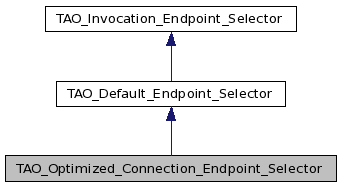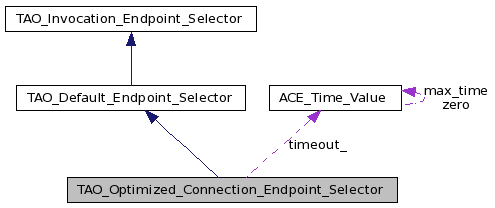More efficient connection strategy for endpoint selection. More...
#include <Optimized_Connection_Endpoint_Selector.h>


Public Member Functions | |
| TAO_Optimized_Connection_Endpoint_Selector (const ACE_Time_Value &tv) | |
| Constructor. | |
| virtual | ~TAO_Optimized_Connection_Endpoint_Selector (void) |
| Destructor. | |
| virtual void | select_endpoint (TAO::Profile_Transport_Resolver *, ACE_Time_Value *max_wait_time) |
Select the endpoint and set r's profile_. | |
Static Public Member Functions | |
| static void | hook (TAO_ORB_Core *, TAO_Stub *, bool &has_timeout, ACE_Time_Value &tv) |
Private Member Functions | |
| int | check_profile (TAO_Profile *, TAO::Profile_Transport_Resolver *) |
Static Private Attributes | |
| static ACE_Time_Value | timeout_ |
More efficient connection strategy for endpoint selection.
This strategy builds on the default by first querying the connection cache for all potential endpoints before iterating over the list to attempt to create new connections.
Definition at line 51 of file Optimized_Connection_Endpoint_Selector.h.
| TAO_Optimized_Connection_Endpoint_Selector::TAO_Optimized_Connection_Endpoint_Selector | ( | const ACE_Time_Value & | tv | ) |
Constructor.
Definition at line 26 of file Optimized_Connection_Endpoint_Selector.cpp.
{
TAO_Optimized_Connection_Endpoint_Selector::timeout_ = tv;
if (TAO_debug_level)
{
ACE_DEBUG ((LM_DEBUG,
ACE_TEXT ("TAO(%P|%t) Optimized Connection Enpoint Selector: ")
ACE_TEXT ("Initializing timeout hook tv = %d sec, %d usec\n"),
tv.sec(), tv.usec()));
}
if (tv > ACE_Time_Value::zero)
{
TAO_ORB_Core::connection_timeout_hook
(TAO_Optimized_Connection_Endpoint_Selector::hook);
}
}
| TAO_Optimized_Connection_Endpoint_Selector::~TAO_Optimized_Connection_Endpoint_Selector | ( | void | ) | [virtual] |
| int TAO_Optimized_Connection_Endpoint_Selector::check_profile | ( | TAO_Profile * | p, | |
| TAO::Profile_Transport_Resolver * | r | |||
| ) | [private] |
Definition at line 63 of file Optimized_Connection_Endpoint_Selector.cpp.
{
TAO_Endpoint *effective_endpoint = 0;
r->profile(p);
effective_endpoint = p->endpoint ();
size_t endpoint_count = p->endpoint_count();
for (size_t i = 0; i < endpoint_count; ++i)
{
TAO_Base_Transport_Property desc (effective_endpoint);
if (r->find_transport(&desc))
return 1;
// Go to the next endpoint in this profile
effective_endpoint = effective_endpoint->next();
}
return 0;
}
| void TAO_Optimized_Connection_Endpoint_Selector::hook | ( | TAO_ORB_Core * | , | |
| TAO_Stub * | , | |||
| bool & | has_timeout, | |||
| ACE_Time_Value & | tv | |||
| ) | [static] |
Definition at line 50 of file Optimized_Connection_Endpoint_Selector.cpp.
{
has_timeout =
TAO_Optimized_Connection_Endpoint_Selector::
timeout_ > ACE_Time_Value::zero;
if (has_timeout)
tv = TAO_Optimized_Connection_Endpoint_Selector::timeout_;
}
| void TAO_Optimized_Connection_Endpoint_Selector::select_endpoint | ( | TAO::Profile_Transport_Resolver * | r, | |
| ACE_Time_Value * | val | |||
| ) | [virtual] |
Select the endpoint and set r's profile_.
Reimplemented from TAO_Default_Endpoint_Selector.
Definition at line 84 of file Optimized_Connection_Endpoint_Selector.cpp.
{
TAO_Stub *stub = r->stub();
TAO_Profile *p = stub->profile_in_use();
// first, look for the endpoints for the current profile in use.
// if that is available then go for it.
if (this->check_profile (p, r) != 0)
return;
// next, look for any other profiles. If the stub has any forward profiles,
// use those, otherwise look at the base profiles. This separation is
// necessary to avoid re-using a corbaloc or other previously forwarded
// profile.
const TAO_MProfile *profiles = stub->forward_profiles();
if (profiles != 0)
{
for (CORBA::ULong count = 0; count < profiles->profile_count(); count++)
{
p = const_cast<TAO_Profile *>(profiles->get_profile(count));
if (this->check_profile (p, r) != 0)
{
if (stub->profile_in_use() != p)
{
// thread-safe way to coerse stub to this profile.
stub->reset_profiles();
while (stub->profile_in_use() != p)
if (stub->next_profile_retry() == 0)
break;
}
return;
}
}
}
else
{
do
{
p = stub->profile_in_use();
if (this->check_profile(p, r) != 0)
return;
}
while (stub->next_profile_retry () != 0);
}
// at this point, we do not have an existing transport, so we must
// reset the profile list and try establishing connections via the
// connector(s).
do
{
r->profile (r->stub ()->profile_in_use ());
// Check whether we need to do a blocked wait or we have a
// non-blocked wait and we support that. If this is not the
// case we can't use this profile so try the next.
if (r->blocked_connect () ||
(!r->blocked_connect () && r->profile ()->supports_non_blocking_oneways ()))
{
const size_t endpoint_count = r->profile ()->endpoint_count ();
TAO_Endpoint *ep = r->profile ()->endpoint ();
for (size_t i = 0; i < endpoint_count; ++i)
{
TAO_Base_Transport_Property desc (ep);
const bool retval = r->try_connect (&desc, max_wait_time);
// Check if the connect has completed.
if (retval)
return;
// Go to the next endpoint in this profile.
ep = ep->next ();
}
}
}
while (r->stub ()->next_profile_retry () != 0);
// If we get here, we completely failed to find an endpoint
// that we know how to use. We used to throw an exception
// but that would prevent any request interception points
// being called. They may know how to fix the problem so
// we wait to throw the exception in
// Synch_Twoway_Invocation::remote_twoway and
// Synch_Oneway_Invocation::remote_oneway instead.
}
ACE_Time_Value TAO_Optimized_Connection_Endpoint_Selector::timeout_ [static, private] |
Definition at line 73 of file Optimized_Connection_Endpoint_Selector.h.
 1.7.0
1.7.0